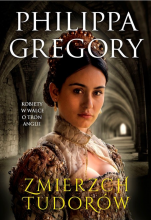
The Last Tudor
Zmierzch Tudorów
Born in Kenya in 1954, Philippa Gregory moved to England with her family and was educated in Bristol and at the National Council for the Training of Journalists course in Cardiff. She worked as a senior reporter on the Portsmouth News, and as a journalist and producer for BBC radio. Philippa obtained a BA degree in history at the University of Sussex in Brighton and a PhD at Edinburgh University in 18th-century literature. Her first novel, Wideacre, was written as she completed her PhD and became an instant world wide bestseller. On its publication, she became a full-time writer, and now lives with her family on a small farm in the North of England. Her knowledge of gothic 18th century novels led to Philippa writing Wideacre, which was followed by a haunting sequel, The Favoured Child, and the delightful happy ending of the trilogy: Meridon. This novel was listed in Feminist Book Fortnight and for the Romantic Novel of the Year at the same time - one of the many instances of Philippa's work appealing to very different readers. The trilogy was followed by The Wise Woman, a dazzling, disturbing novel of dark powers and desires set against the rich tapestry of the Reformation, and by Fallen Skies, an evocative realistic story set after the First World War. Her novel A Respectable Trade took her back to the 18th century where her knowledge of the slave trade and her home town of Bristol produced a haunting novel of slave trading and its terrible human cost. This is the only modern novel to explore the tragedies of slavery in England itself, and features a group of kidnapped African people trying to find their freedom in the elegant houses of 18th century Clifton. Gregory adapted her book for a highly acclaimed BBC television production which won the prize for drama from the Commission for Racial Equality and was shortlisted for a BAFTA for the screenplay. Next came two of Gregory's best-loved novels, Earthly Joys and Virgin Earth, based on the true-life story of father and son John Tradescant working in the upheaval of the English Civil War. In these works Gregory pioneered the genre which has become her own: fictional biography, the true story of a real person brought to life with painstaking research and passionate verve. The flowering of this new style was undoubtedly The Other Boleyn Girl, a runaway best-seller which stormed the US market and then went worldwide telling the story of the little-known sister to Anne Boleyn. Now published in 26 countries with more than a million copies in print in the US alone, this is becoming a classic historical novel, winning the Parker Pen Novel of the Year award 2002, and the Romantic Times fictional biography award. The Other Boleyn Girl was adapted for the BBC as a single television drama and a film starring Scarlett Johansson as Mary Boleyn, Natalie Portman as Anne Boleyn and Eric Bana as Henry VIII. Six Tudor novels later, she is looking at the family that preceded the Tudors: the magnificent Plantagenets, a family of complex rivalries, loves, and hatreds.
She lives in Yorkshire in the North of England with her husband and two children and in addition to interests that include riding, walking, skiing and gardening (an interest born from research into the Tradescant family for her novel, Virgin Earth), she also runs a small charity building wells in school gardens in The Gambia. More than fifty wells have been built by UK donors to date.
Jane Grey was Queen of England for nine days. Using her position as cousin to the deceased king, her father and his conspirators put her on the throne ahead of the king’s half-sister Mary, who quickly mustered an army, claimed her crown and locked Jane in the Tower. When Jane refused to betray her Protestant faith, Mary sent her to the executioner’s block. There Jane turned her father’s greedy, failed grab for power into her own brave and tragic martyrdom. ‘Learn you to die’ is the advice that Jane gives in a letter to her younger sister Katherine, who has no intention of dying. She intends to enjoy her beauty and her youth and find love. But her lineage makes her a threat to the insecure and infertile Queen Mary and, when Mary dies, to her sister Queen Elizabeth, who will never allow Katherine to marry and produce a potential royal heir before she does. So when Katherine’s secret marriage is revealed by her pregnancy, she too must go to the Tower. ‘Farewell, my sister,’ writes Katherine to the youngest Grey sister, Mary. A beautiful dwarf, disregarded by the court, Mary finds it easy to keep secrets, especially her own, while avoiding Elizabeth’s suspicious glare. After watching her sisters defy the queen, Mary is aware of her own perilous position as a possible heir to the throne. But she is determined to command her own destiny and be the last Tudor to risk her life in matching wits with her ruthless and unforgiving cousin Elizabeth.